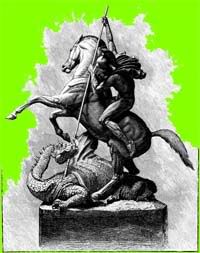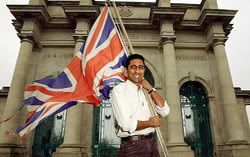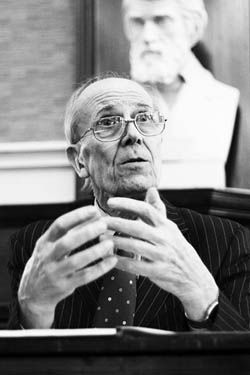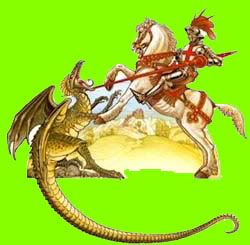 England can't claim such a high-profile patron saint as, say, the US, which is represented by the Immaculate Conception. (The New York Times complained in 1871 that Jay Gould wanted to make St Patrick the country's patron saint, but I suspect that's a different story.)
England can't claim such a high-profile patron saint as, say, the US, which is represented by the Immaculate Conception. (The New York Times complained in 1871 that Jay Gould wanted to make St Patrick the country's patron saint, but I suspect that's a different story.)But St George is patron saint of this great country, and I look forward to celebrating his feastday tomorrow. Unfortunately, there's not that much going on in Cambridgeshire, at an official level at least: the Cambridge News's Jack Grove reports that Waterbeach's Beach Social Club will celebrate the great British banger with butchers entering their sausages in a competition, and Ely and District Scouts will fly their colours in a St George's Day parade on Sunday. (And in London, Boris Johnson's administration is putting on a free concert in honour of the saint on Friday.)
As a fellow exile living in England - though from not nearly as far away - I liked the introduction to the Archbishop of York Dr John Sentamu's speech on Englishness at the Sunday Times Literary Festival in Oxford earlier this month. It was a quote from a piece reputed to have been written by a Frenchman:
The last sentence, as the Archbishop points out, represents the heresy of Pelagianism, but the peice describes exactly both the self-confidence and self-deprecating humour that are part and parcel of the archtypal English character, and his "tentative conclusion" that "Englishness is back on the agenda" was reassuring.
There are four kinds of people in the UK -
First, there were the Scots who kept the Sabbath - and everything else they could lay their hands on;
Then there were the Welsh - who prayed on their knees and their neighbours;
Thirdly there were the Irish who never knew what they wanted - but were willing to fight for it anyway.
Lastly there were the English who considered themselves self-made men, - thus relieving the Almighty of a terrible responsibility
It was concerning, however, to be directed by Damian Thompson, in his Holy Smoke blog for the Telegraph, to an article by the left-wing Christian think-tank Ekklesia which complains that
just as he was co-opted by the crusaders, so St George’s misappropriation as an excluding or dominating figure has continued in recent history. And it is not just the BNP who have done this. His elevation has happened in the political mainstream, too. In parliament, he sits over the exit from the Central Lobby of the House of Lords, lending presiding authority to the vestiges of an unelected, top-down social order.Having laboured under a socialist government for 12 years, I don't have any problems with their objection to a "top-down social order". But the organisation continues: "We say that it is high time St George was reclaimed from the dragon, from past associations with racism and the far right, from religious crusades, from inward-looking nationalism, and from images of arrogant flag-waving."
I'm not saying that we should be complacent about "far-right" organisations (who want blanket nationalisations and micromanagement? Go figure) and we should certainly heed the warning of the Archbishop of Canterbury that the recession may fuel social unrest and x
 enophobia. But the aspect of multiculturalism that warms my heart most is that represented by Sri Lankan-born postmaster Deva Kumarasiri who, Lucy Cockcroft reports, turned away five people for "wasting time and holding up the queue" because they didn't speak English - he believes that immigrants should learn English and love their adopted country.
enophobia. But the aspect of multiculturalism that warms my heart most is that represented by Sri Lankan-born postmaster Deva Kumarasiri who, Lucy Cockcroft reports, turned away five people for "wasting time and holding up the queue" because they didn't speak English - he believes that immigrants should learn English and love their adopted country.I can understand this. When I lived in Italy and France, I learned the languages, bought local, and grew to appreciate the many strong points of those countries. Unfortunately, the local Muslim community presented owner Rizwan Raja with a petition objecting to being told to speak English in England, and he was told not to turn in for work. I say "unfortunately" because if yo
 u've seen a bus driver who can't speak great English trying to speak to a prospective customer who has the same problem, then you'll understand that the problems caused by not speaking English in a country where that is the language are not confined to any one group.
u've seen a bus driver who can't speak great English trying to speak to a prospective customer who has the same problem, then you'll understand that the problems caused by not speaking English in a country where that is the language are not confined to any one group.Norman Tebbit, MP and Minister in Margaret Thatcher's government and now Lord Tebbit, proposed a "cricket-test" as one measure of integration of immigrants into England. He said that, say, Pakistanis would pass this test if they supported England against Pakistan at the game of cricket. (When attacked for his "far-right" views on a political discussion programme, Question Time, soon afterwards, he replied that he'd be just as happy for immigrants to vote Labour as Conservative.) Once again, Lord Tebbit brought good sense to the vexed topic of integration earlier this year when he wrote, in the context of councillors in Oxford be
 ing unwilling to turn down applications for a loudspeaker-system in a Mosque, that Muslims be invited to turn their minds to Allah by bells within the Mosque - it would be in character with the area, and the Koran comes down in favour of neither.
ing unwilling to turn down applications for a loudspeaker-system in a Mosque, that Muslims be invited to turn their minds to Allah by bells within the Mosque - it would be in character with the area, and the Koran comes down in favour of neither.Tomorrow I dare say I'll have a pint at the Tintinnabula - not with far-right racist flag-wavers, but with decent, hard-working flag-wavers of all political (and other) hues. Trying to slay the dragon that tempts us to be defined by our differences, I'll wish them, as I wish Deva Kumarasiri, Lord Tebbit, Archbishop Sentamu, and you: happy St George's Day!
This being also the anniversary of William Shakespeare's death in 1616, I think this is the best I can leave you with:
This earth of majesty, this seat of Mars,
This other Eden, demi-paradise,
This fortress built by Nature for herself
Against infection and the hand of war,
This happy breed of men, this little world,
This precious stone set in the silver sea,
Which serves it in the office of a wall,
Or as a moat defensive to a house,
Against the envy of less happier lands,
This blessed plot, this earth, this realm, this England
Richard II, Act 2, Scene I
Related post: let England stand free
top ten songs about England
Happy St George's Day!












Agreeing with most of what you said, I don't know if I'd go with the cricket test. Judging by football fans, they seem to go with the team whose players they know the best (stats, personalities, etc.) rather than with the home team, though I grant that often it is the home team they know the best.
ReplyDeleteAmusing description of the various UK peoples - I'd not heard that one.
Yes, I thought the description was brilliant!
ReplyDeleteI see what you're saying - we've got a newseader called Sir Trevor MacDonald over here who is a past master of the art; he was born in Trinidad, and he admitted that he'd fail the cricket test, in that he'd support the side from Trinidad and Tobago. On the other hand, a Pakistani man who played for England was once denounced as a traitor. I'd say that was a definite failure of the cricket test!
Sorry I didn't pick your comment up quicker, my concentration's gone with this bug.